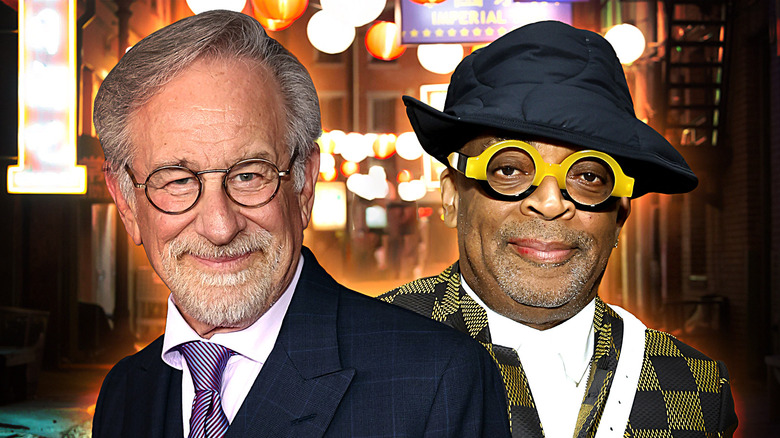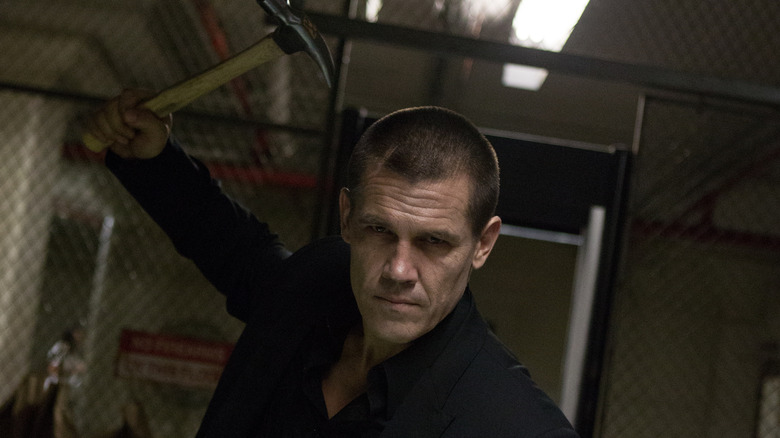Steven Spielberg Almost Directed One Of Spike Lee's Biggest Flops
Will Smith and Steven Spielberg were on a similar wavelength in the 2000s. After he finished licking his wounds from 1999's "Wild Wild West," Big Willie was hungry to prove his mettle as a dramatic actor. Adapting a bit of a one-for-them-one-for-me mentality, Smith earned his first two acting Oscar nods for "Ali" and "The Pursuit of Happyness" in-between nodding his head as Agent J and tearing up the streets of Miami again as Mike Lowrey. Even his tentpoles started to get a little darker and heavier along the way, with the actor anchoring a big screen rendition of Richard Matheson's end-times sci-fi horror tale "I Am Legend" and playing a hard-edged, heavy-drinking superhero in "Hancock."
Spielberg, meanwhile, spent the first decade of the 21st century redefining his work. Really, there was very little he didn't try his hand at during this period, from crafting disquieting, noirish visions of the not-too-distant future to coming-of-age tales or feel-good comedies that are light on their feet yet sincere in their sentimentality (and even a tad salacious, at least by Spielberg's standards). Even looking at the films he nearly made in the '00s (like "Memoirs of a Geisha," "The Curious Case of Benjamin Button," and "Big Fish"), you get a portrait of an artist who's eager to spread his wings and truly distinguish himself from the creative he was ... or, rather, the one he'd been pigeonholed as.
"Oldboy" was likewise far removed from anything either Smith or Spielberg had done by then. So, when the pair began planning a new take on the source material for Park Chan-wook's exquisite 2003 Korean revenge flick (writer Garon Tsuchiya and illustrator Nobuaki Minegishi's 1990s Japanese manga "Old Boy"), it made a certain sense and felt like it could even become the next "The Departed" (i.e. a great American revamp of a celebrated international movie by a Hollywood titan). Still, perhaps it's best that Smith and Spielberg's "Oldboy" never came to be, considering what happened after Spike Lee assumed the reins instead.
Oldboy is no Spike Lee joint (literally)
Park's "Oldboy" follows a well-to-do businessman who is inexplicably imprisoned in a hotel room for 15 years, only to be suddenly freed to hunt down his enigmatic captor. The specific social anxiety it taps into — that you've unwittingly wronged someone or been unknowingly complicit in their suffering — is one that most everybody can relate to in our chronically online modern world. Back in the '00s, though, it was something many Americans were experiencing in a wholly different context as they tried to wrap their heads around the terrorist attacks on September 11, 2001, and how their government's previous actions had contributed to them. Certainly, that question was at the forefront of Spielberg's mind while directing films like "War of the Worlds" and especially "Munich" at that time.
Much as that might've been the impetus for Spielberg to want to re-imagine "Oldboy," he and Smith left the project in 2009 after DreamWorks failed to secure a deal for the original manga rights. The two were ultimately replaced by Spike Lee and Josh Brolin, a pairing that, coupled with the subject matter, showed promise. Who better to tell a story about a man with fairly deep pockets and a comfortable life being violently forced to check his privilege than the director of "Do the Right Thing"? Alas, those who argued against trying to Americanize "Oldboy" were soon after validated by the movie's unflattering critical reception (39% on Rotten Tomatoes) and dismal box office returns ($5.2 million at the global box office on a $30 million budget).
It didn't have to be that way, though. Park's "Oldboy" is an odd creature filled with moments both ghastly and twisted, yet it shows immense compassion for its deeply-flawed protagonist and antagonist alike. Even the movie's renowned one-take hammer hallway fight is a subversion of the kind of typical action sequence you get in most revenge flicks (with its objective camera perspective and Jo Yeong-wook's melancholic score undercutting the violence). It's plausible Lee's longer and, presumably, more ruminative initial cut hewed closer to that, before he was strong-armed into heavily re-editing his retelling by the film's producers. The result, much like the movie's version of the hammer brawl, is a shallow retracing of Park's classic. No wonder it's the one occasion Lee removed his signature "A Spike Lee Joint" label from a film he directed.

